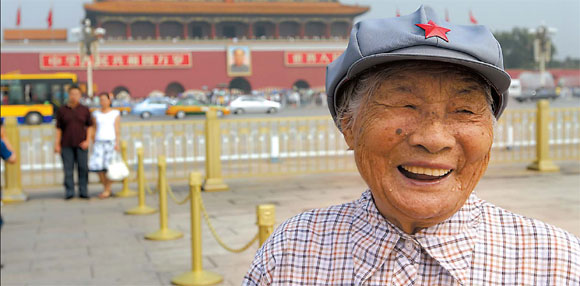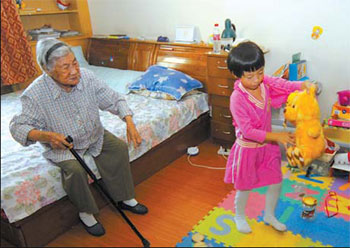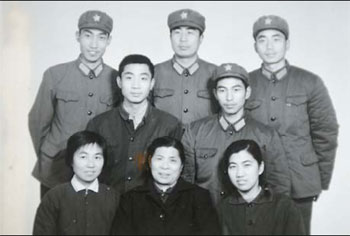Wishing upon a star
|
Tian'anmen Square is Pu Wenqing's favorite place. |
Seventy years ago, American journalist Edgar Snow published his famous biographical book Red Star Over China. Snow revealed the two years he spent with the soldiers of the Chinese Communist Party's Red Army and vividly recorded what he saw, heard and learnt. He captured moving stories and lofty spirits of this heroic odyssey.
Today, 89-year-old Pu Wenqing is one of few surviving Red Army soldiers who experienced the historic event, a military displacement led by the Communist Party of China (CPC) from 1934 to 1936.
In 1933, Pu, then 15, joined the Red Army and four years later became a member of CPC. She also got her formal name - Pu Wenqing - from her comrades in arms before setting out on the Long March.
|
Pu Wenqing with her granddaughter at home. Pu's spirit has great influence on the young generation of her family. |
"My mother can hardly hear anything now, but she often tells us she misses her comrades who sacrificed their lives during the Long March," says Pu's eldest daughter, 66-year-old He Li. "She says she is a survivor, which means she had the obligation to trace the footprints of those who went on the March."
Pu indeed lined up to her words over the past few decades. In He's words, as a core of a big family of 28 members, Pu's life story has influenced the thoughts and behavior of her children and grandchildren.
It is a story of an 89-year-old mother's journey, everything from a courageous woman who witnessed the birth of her nation to its current prosperity.
In 1918, Pu was born in an impoverished family in Bazhong County, in Southwest China's Sichuan Province. She was part of a big family as the youngest girl. She never saw her two elder brothers and two sisters, because they had to leave home to work for landlords in a bid to feed themselves. Her life was a wretched one riddled with famine and disease, and her family suffered under abusive landlords.
On one freezing winter day, when the landlord saw 4-year-old Pu and her elder sister warming themselves by a fire, which was lit to boil salt in his yard, he kicked the little girls into the fire. The burns seriously damaged fingers of Pu's hand and left scars all over her body. Two years later, Pu's mother died from typhoid.
In 1932, when Pu was 14, a group of guerilla soldiers set up camp in her hometown. She heard they called themselves the "Workers' and Peasants' Red Army" and worked towards the goal of liberating poor people such as herself.
Pu was skeptical of them and warily watched those soldiers, who wore hats with red stars. However, it was not long before she really saw how differently they treated the poor people from the landlords.
In September 1933, Pu escaped from her nightmarish life and joined the Fourth Army division of the Red Army. She became a nurse and started out on the Long March the following July.
|
Pu Wenqing (center, first row) with her children in 1975, all of whom served in the army. |
Before scaling to a snowy mountain in Tibet, at an altitude of 3,000 meters, Pu had been suffering from a serious and painful eye disease. She could barely see anything but still insisted on taking care of Song Yimin, a badly injured commander. His legs were torn apart by bullets, and his broken bones protruded from his skin.
With five other teenage nurses, Pu carried Song on a stretcher through hail and blizzards. They were exhausted but had to move on, because stopping meant they would freeze to death.
As they trudged up the mountainside, a raging thunderstorm struck and thick hail fell from the sky. In order to protect Song, the young nurses took off their coats and covered his legs. When the weather got worse, all of them huddled over Song and shielded him with their bodies.
"Leave me, and keep moving," Pu heard Song said faintly through black lips as he struggled to push the coats off him. He worried about the young nurses and tried to give them back their coats. After the squall passed, they realized Song had died. They buried the hero in grief.
Pu says she still remembers Song's final words: "You have finished your mission; head to our victory."
During the rest of the Long March, no matter how hard and dangerous it was to cross high snowy mountains and deadly marsh lands, Pu had been supported by this spirit and devoted herself to serving others.
In a ceremony held in Beijing last year to celebrate the 70th anniversary of the Long March, Pu, wearing a Red Army uniform, narrated her experience. She said it taught her dedication, a virtue that stayed for the rest of her life.
"It is the soul of our nation; we should never forget the 200,000 soldiers who sacrificed their lives to fight for liberation," Pu says.
In the following War of Resistance against Japanese Aggression from 1937-45, Pu worked with her comrades in Yan'an, Northwest China's Shaanxi Province. In 1937, Pu joined the CPC and in 1939 married He Bingwen, a transportation officer in Yan'an. They had two daughters and five sons, all of whom became soldiers and members of the CPC.

In 1956, Pu quit her job in the Ministry of Transportation and began to work for the neighborhood committee in Dongcheng District in Beijing. Though the pay was much lower than that of her previous job, she thought it was the right position, because she could do her best to help others.
During the famine at the beginning of 1960s, Pu often gave food to the poor people, leaving her own children in hunger.
She used to support a woman who had to live on selling her own blood for several years and also cared for a lonely, old couple.
"Life is enriched not by what you get but by what you give," was always Pu's mantra, and it is an attitude that has been adopted by her children and grandchildren.
In 1971, after graduating from college, He Li went to work for her mother's neighborhood committee. Over the following 10 years, she followed her mother's example, helping people in need.
"Without my grandma's education and influence, this family wouldn't be so happy," says Han Tao, Pu's grandson, who returned from the United States to start his business in China.
Over the past few decades, Pu has been concerned about news and has taken part in many social activities. This week, as the 17th National Congress of CPC opens in Beijing, as a 70-year CPC member, Pu says her country will become stronger and richer in the future.
And she says this because she believes the spirit of Long March will never die.
(China Daily 10/16/2007 page19)

















